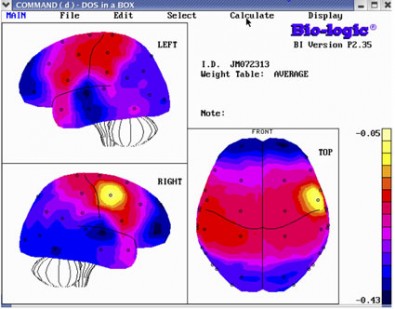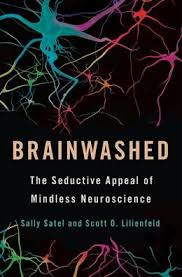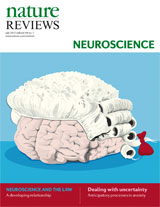
Evidence of John McCluskey’s brain abnormalities presented by his defense team. Blue areas represent larger deviations from normal. PACER
John McCluskey escaped from an Arizona prison in July, 2010. A few days later, he and two accomplices — one of whom was both his cousin and fiancee – carjacked Linda and Gary Haas, a vacationing Oklahoma couple in their 60s. McCluskey shot the Haases inside the camping trailer they were towing behind their truck, and set the trailer on fire with their bodies still inside. McCluskey was convicted for the carjacking and two murders in federal court on Oct. 7.
Yesterday the jury charged with deciding his sentence announced that it had been unable to come to a unanimous decision on the death penalty. That means he’ll get life without parole.
Perhaps it’s little wonder the jury couldn’t agree — they’d been given a lot to consider. McCluskey’s defense team had tried to convince them that he has several brain defects that, combined with other factors, contributed to his crimes and should be considered mitigating circumstances. The defense presented the results of several types of brain scans and various psychological tests, as well as testimony from neurologists and other experts.
Read the full article at WIRED magazine. December 12, 2013. By Greg Miller.


 This September, a
This September, a  Brainwashed: The Seductive Appeal of Mindless Neuroscience, a new book by psychiatrist Sally Satel and psychologist and professor Scott O. Lilienfeld, argues that current real-world applications of neuroscience may be misguided and even harmful.
Brainwashed: The Seductive Appeal of Mindless Neuroscience, a new book by psychiatrist Sally Satel and psychologist and professor Scott O. Lilienfeld, argues that current real-world applications of neuroscience may be misguided and even harmful. ABSTRACT: In the past 8 years, the US Supreme Court has issued landmark opinions in three cases that involved the criminal culpability of juveniles. In the most recent case, in 2012, a ruling prohibited states from mandating life without parole for crimes committed by minors. In these cases, the Court drew on scientific studies of the adolescent brain in concluding that adolescents, by virtue of their inherent psychological and neurobiological immaturity, are not as responsible for their behaviour as adults. This article discusses the Court’s rationale in these cases and the role of scientific evidence about adolescent brain development in its decisions. I conclude that the neuroscientific evidence was probably persuasive to the Court not because it revealed something new about the nature of adolescence but precisely because it aligned with common sense and behavioural science.
ABSTRACT: In the past 8 years, the US Supreme Court has issued landmark opinions in three cases that involved the criminal culpability of juveniles. In the most recent case, in 2012, a ruling prohibited states from mandating life without parole for crimes committed by minors. In these cases, the Court drew on scientific studies of the adolescent brain in concluding that adolescents, by virtue of their inherent psychological and neurobiological immaturity, are not as responsible for their behaviour as adults. This article discusses the Court’s rationale in these cases and the role of scientific evidence about adolescent brain development in its decisions. I conclude that the neuroscientific evidence was probably persuasive to the Court not because it revealed something new about the nature of adolescence but precisely because it aligned with common sense and behavioural science.
